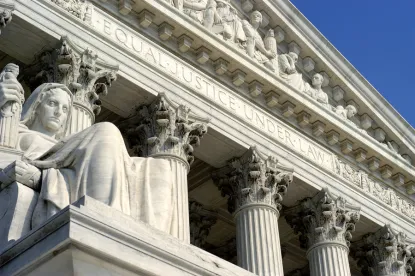On June 1, the U.S. Supreme Court in GE Energy Power Conversion France SAS v. Outokumpu Stainless USA, LLC, 590 U.S. ___ (June 1, 2020) unanimously held that a non-party may enforce an international arbitration agreement under the equitable estoppel doctrine. This decision resolves a circuit split as to whether the New York Convention — a multilateral treaty regarding international arbitration agreements and awards to which the U.S. is a party — permits a non-party to invoke state law of equitable estoppel to compel international arbitration.
The Backdrop and Circuit Split
The U.S. Supreme Court has long held that federal law liberally favors arbitration agreements as a matter of policy — particularly so in international contexts. Mitsubishi Motors Corp. v. Soler Chrysler-Plymouth, Inc., 473 U.S. 614, 629 (1985); Moses H. Cone Mem’l Hosp. v. Mercury Constr. Corp., 460 U.S. 1, 24 (1983). Consistent with that policy, the Court had previously ruled that, for domestic arbitrations, certain principles of state law allow written arbitration agreements to be enforced by or against even nonparties to the contract. Arthur Andersen LLP v. Carlisle, 556 U.S. 624, 630–31 (2009).
In 2008, the First Circuit ruled that a non-signatory to an international arbitration agreement could enforce the agreement as against the signatories under an equitable estoppel theory in Sourcing Unlimited, Inc. v. Asimco Int’l, Inc., 526 F.3d 38 (1st Cir. 2008). The First Circuit explained that equitable estoppel is a doctrine which “precludes a party from enjoying rights and benefits under a contract while at the same time avoiding its burdens and obligations.” Id. at 47 (quoting InterGen N.V. v. Grina, 344 F.3d 134, 145 (1st Cir. 2003)). Because it is the signatory party that is equitably estopped from avoiding its contractual obligations, it was irrelevant whether the opposing party was also a signatory. Id. at 48. The Fourth Circuit issued a consistent ruling in 2012 in Aggarao v. MOL Ship Mgmt. Co., 675 F.3d 355, 375 (4th Cir. 2012), holding “that the doctrine of equitable estoppel applies, and that [the Claimant] must arbitrate his claims against the signatory . . . as well as those claims alleged against the nonsignatories.”
In 2017, however, the Ninth Circuit departed from the rulings of the First and Fourth Circuits in Yang v. Majestic Blue Fisheries, LLC, 876 F.3d 996, 1002–03 (9th Cir. 2017). The Yang court concluded that under California’s domestic law, a defendant cannot compel international arbitration under an equitable estoppel theory as a non-signatory to the arbitration agreement.
In 2018, the Eleventh Circuit concluded in accord with the Ninth Circuit in Outokumpu Stainless USA, LLC v. Converteam SAS, 902 F.3d 1316, 1326 (11th Cir. 2018). The Eleventh Circuit held that the New York Convention requires that the arbitration agreement be “signed by the parties before the Court or their privities.” The court ruled that the non-signatory therefore cannot compel international arbitration through estoppel. Id. at 1327.
To resolve this circuit split, the Supreme Court granted certiorari on petition to review the Eleventh Circuit’s Outokumpu ruling. In GE Energy Power Conversion France SAS v. Outokumpu Stainless USA, LLC, the Supreme Court rejected the Ninth and Eleventh Circuits’ rulings and agreed with the First and Fourth Circuits.
The Supreme Court Resolves the Split — Equitable Estoppel Doctrines Can Apply to International Arbitration Agreements
In GE Energy, ThyssenKrupp Stainless USA, LLC, contracted with F. L. Industries, Inc., to build mills at ThyssenKrupp’s manufacturing plant. The contracts defined the “parties” as encompassing subcontractors and included international arbitration clauses. After executing the contracts, F. L. Industries engaged a subcontractor to provide motors for the mills. The subcontractor was the entity now known as GE Energy Power Conversion France SAS. Soon thereafter, the plant in which the mills were built was acquired by Outokumpu Stainless USA. When a dispute arose over the motors in the mills, Outokumpu sought to resolve the disputes in court. GE Energy sought to enforce the international arbitration clauses in the general contractor contracts. Specifically, GE Energy alleged that Outokumpu, as successor in interest to the contracts, was equitably estopped from avoiding its pledge to arbitrate all disputes “in connection with or in performances of” the contracts.
The Supreme Court’s ruling followed its review of the language of the New York Convention and its implementing legislation in Chapter 2 of the Federal Arbitration Act. The Court confirmed that the New York Convention requires U.S. courts to refer the parties to arbitration when the parties to an action have entered into a written agreement to arbitrate. GE Energy, slip op. at 6. However, this is only one non-exclusive circumstance in which the courts must do so. Id.at 6–7 (“[The Convention] does not state that arbitration agreements shall be enforced only in the identified circumstances.”). Therefore, because the New York Convention did not state that only signatories could compel arbitration, the Court concluded that it sets the floor — not the ceiling — for U.S. courts’ recognition of enforceable arbitration agreements. Id. at 7.
In sum, the Court ruled that the state law of equitable estoppel can permit non-signatory parties to seek enforcement of a contractual agreement to arbitrate for international arbitrations. However, the Court limited its ruling to the question of law and declined to rule on whether the doctrine applied on the facts of the case. Instead, the Court remanded for the lower courts to determine whether equitable estoppel requires enforcement of the arbitration clause.
Key Takeaways
This decision not only reinforces long-standing precedent favoring arbitration, it also illustrates how U.S. legal principles may be used when seeking to enforce international arbitration clauses within the United States. Specifically, parties to an international commercial dispute brought in a U.S. court should investigate whether an agreement to arbitrate exists that may compel a party to international arbitration even if the party has not signed the agreement.






 />i
/>i

